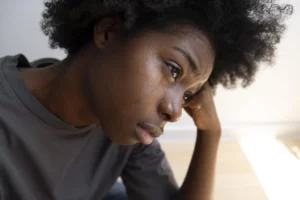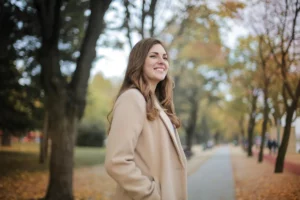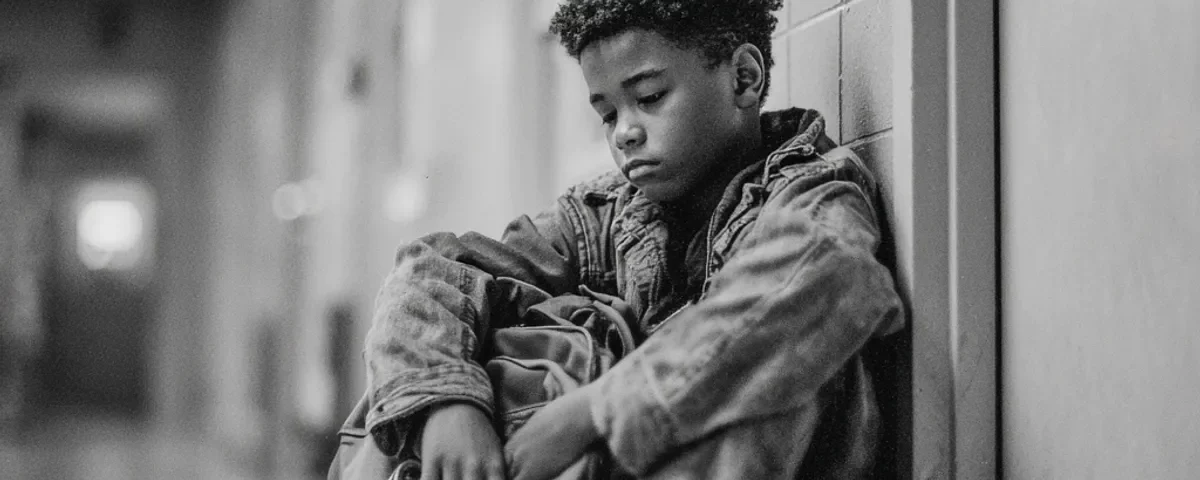It was supposed to be a quick stop at the hospital to pick up paperwork. Instead, I found a little boy sitting alone on the floor—and nothing about my life was the same after that.
I never thought a simple trip to the hospital would completely undo me, then put me back together with a new purpose, all in the same afternoon. That’s what happened when I met little Malik.
It started with something boring and routine. I had been dealing with estate paperwork since my mom passed from cancer a month earlier. And that day, I needed to pick up her final pathology records from the oncology department.
I had already made three phone calls to coordinate with the hospital’s records office. I was finally told to swing by to collect the hard copies in person, but I did not want to go. Just the idea of walking those hallways again made my stomach turn, but I knew I had to finish what she started.
I had just collected the envelope, sealed and stamped with medical jargon I did not want to read, and was walking past the oncology ward when I saw him.
He was a little boy, no more than eight, sitting all alone, curled up on the cold floor near the double doors. The boy was clutching a worn-out backpack so tightly that the straps dug into his small arms. His eyes were red, his cheeks blotchy, and his body shook with each quiet sob.

Everyone walked past him like he was invisible. But seeing him stopped me cold.
I crouched beside him and spoke gently, “Hey, buddy. What’s wrong?”
He did not look up right away. When he finally did, his voice was so quiet I had to lean in.
“I… I don’t want my mom to die,” he whispered with tear-streaked cheeks. “She’s in there. She went inside and told me to wait here, but… I’ve been waiting a long time, and I don’t know what’s happening. There’s no one else.”
He blinked fast like he was trying not to cry again. His small hands gripped his backpack tighter, as if it could somehow protect him.
My heart broke.
I sat down beside him on the linoleum floor, ignoring the people staring. I did not care. This child was alone, and I was not going to be another adult who ignored him. I could see the fear in his eyes, that pure, raw worry that no child should ever have to feel.
“What’s your name?” I asked softly.
“Malik.”
“Hi Malik. I’m Millie. I know this place is scary. I understand. I’m right here. Do you want to tell me what’s going on?”
He took a shaky breath and nodded. “It’s just me and my mom now. She got sick a while ago. Really sick. She still tried to work to pay for her treatment, but she got too tired. I tried to help. I sold some of my favorite toys, comic books, and even my Nintendo. I put the money in her purse when she wasn’t looking.”
That cracked something deep inside me, and my chest tightened.
I had not expected to break down that day. I thought I had already cried every tear there was to cry. But this boy, this sweet, frightened boy, was carrying a weight no child should bear. I knew that weight because I had just put it down.
A month ago, I had been him.
I remembered sitting in the same hallway outside the same ward, staring at the same linoleum, praying for a miracle that never came. I had all the resources, all the connections, but the cancer diagnosis came too late, and it progressed too fast.
My mom was gone within three weeks of her diagnosis. And now, here was Malik, fighting the same monster but with fewer weapons. I did not ask him more questions; I did not need to. Sometimes just being there is more powerful than all the right words.
When he leaned against my shoulder, I let him.
After a while, a nurse called his name, and Malik jumped to his feet like a bolt of lightning.
A woman stepped out from the consultation room, pale and trembling. She looked exhausted and pale, like she had lived a thousand years in one hour.
Her hair was tied back in a messy bun, and her oversized hoodie hung off her like a flag of surrender.
She smiled when she saw Malik, but her eyes flicked to me with quiet alarm.
“Mom!” Malik ran to her and wrapped his arms around her waist.
I stood and cleared my throat. “Hi. I’m Millie. I was keeping Malik company while he waited. I hope that’s okay.”
She nodded slowly. “Thank you. It’s just me and him… I had no choice but to leave him outside. They won’t let kids in during consultations.”
I nodded. “I understand.”
There was an awkward silence, so I followed a nudge in my gut.
“I know this might sound strange, but I’d really like to see you both again. I have something for you both. Could I have your address, and stop by tomorrow morning? Around 10 a.m.? Just to talk.”
She looked surprised, even hesitant. Her eyes darted from me to Malik. The boy and his mom exchanged wary glances because they didn’t know me.
Then Malik tugged at her sleeve. “Mom… this lady is like a fairy from a storybook.”
That nearly undid me. I blinked hard to stop my tears from falling.
When I met Malik, I knew I had a chance to step in—something I never had an opportunity to do for my own mom.
Malik’s mom bit her lip. “Alright. I guess that would be okay.”
I typed her address into my phone and gave her a warm smile before I left.
That night, I barely slept. I paced, I made tea, and I reread old texts from my mom. I even opened the sealed envelope from the hospital. But I could not bring myself to read it.
The next morning, I stopped by a bakery on the way. I bought a dozen blueberry muffins and two chocolate croissants for Malik.
When I pulled into their neighborhood, my chest tightened. Their building was run-down, one of those old brick places with flaking paint and a metal stairwell that creaked when you walked on it.
I knocked on their door, and after a moment, Malik opened it with a giant smile.
“You came!” he said.
“Of course I did!”
Inside, their apartment was tidy but sparse. There was a single couch, a small TV, and a tiny table with mismatched chairs. There were no pictures on the wall, no signs of celebration or joy—just survival.
His mom, who finally introduced herself as Mara, greeted me with cautious warmth. She looked even thinner in the daylight, her face pale under fluorescent bulbs. She made us instant coffee, and we sat at the kitchen table while Malik devoured his croissants.
They told me more about their life. Mara had stage 2 lymphoma. It was treatable, but expensive. Her insurance had lapsed when she could no longer work full-time, and the state coverage barely scraped the surface.
She was trying to save money by skipping doses. Little Malik was still selling toys and doing small chores to help pay for her treatments. I couldn’t imagine the stress on that little boy, carrying the weight of life and death on such small shoulders.
I felt sick listening to their struggles.
“Let me help,” I said.
Mara blinked. “What?”
“I want to pay for your treatment. All of it. Every scan, test, and dose.”
“No,” she said immediately. “We can’t accept that, we can’t pay you back. Plus, you don’t even know us.”
“I know enough,” I said. “And I’ve been where you are. Let me do this.”
She started to cry. Not the loud, heaving kind, just quiet tears that slid down her cheeks while she held her coffee cup like a shield.
Malik looked up at me. “Does this mean she won’t die?”
I reached across the table and took his hand.
“It means we’re going to fight like hell so she doesn’t have to.”
The next week passed like a whirlwind.
I connected Mara with an oncologist I had known during my mom’s final months. Dr. Chen was kind but firm, and when she heard the full situation, she didn’t hesitate to make room in her schedule.
I covered the cost of Mara’s imaging and her first round of chemo, but I didn’t tell her how much. I knew if she saw the bill, she would try to refuse again.
Malik called me the night before his mom’s first treatment. His voice trembled on the phone.
“Miss Millie? I don’t know what I’m supposed to do while she’s in there. What if something happens and I’m not with her?”
I tried to steady my voice. “Nothing is going to happen, Malik. She’s getting treatment because you helped her hold on this long. You’re the reason she’s still fighting. But I’ll come sit with you, just like last time, okay?”
He sniffled. “Okay. Can we get a muffin after?”
“You can get two muffins. One for each hand.”
The next morning, I picked them up in my car and drove them to the hospital. Mara was quiet, her hands trembling in her lap. Malik leaned against his seat, and he looked deep in thought.
That afternoon, while Mara was getting her infusion, he and I sat in the hospital café. He told me about his old school and the toys he had sold. That amazing child even shared how he used to fall asleep to the sound of his mom coughing in the next room.
He said it as if it were just part of life, like everyone had to do that.
“You know what I used to wish for every birthday?” he asked, tearing a corner off his chocolate muffin.
“What?”
“That I would wake up and she’d be better. Not rich or anything. Just better. Like she could walk up the stairs without stopping. Or not fall asleep at 7 p.m.”
“And did you tell her that wish?”
He shook his head. “She’d feel bad. So I told her I wished for a skateboard.”
I felt that moment like a punch to the chest.
“You’ve got a brave heart, Malik.”
“I think it’s just a regular one. It just hurts a lot sometimes.”
By the third week, Mara was responding well to treatment. Her color had returned a little, and she even cracked a joke as she climbed into the car. Malik noticed every change, celebrating them like wins in a game only they could play.
“She didn’t throw up this time!” he shouted as we pulled out of the parking garage. “She said the nurse said her counts looked better!”
I looked back at him and grinned. “Then it’s time to celebrate. You know what I think?”
He leaned forward, eyes wide.
“I think you need a day to just be a kid. No hospitals or medicine, just rides, sugar, and pretending you’re a space ranger.”
“Wait. What are you saying…?”
“I already got the tickets. We’re going this Saturday.”
“Going where?” he asked, brimming with excitement.
“Disneyland, of course!”
He screamed so loud in the backseat that I thought the windows might crack!
It was the most beautiful sound I have ever heard!
I waited to inform Mara of my plan privately. At first, she resisted. She complained about being too tired, that it was too much. But when I reminded her it would be a day for her and Malik to spend living, and not just surviving, she finally nodded.
Saturday arrived with sunshine and cool wind.
I rented a wheelchair for Mara and brought a backpack full of snacks and water bottles. Malik wore a baseball cap three sizes too big and practically skipped through the gate.
He talked nonstop!
“Are we doing Space Mountain first or saving it? What about the Pirates one? Do you like churros? I think I’m gonna scream on every ride, even if it’s not scary.”
Mara laughed more in those few hours than I had seen her laugh since we met! She took photos with Malik, ate a bite of his ice cream cone, and wore a pair of sparkly mouse ears he insisted she had to have!
At one point, after a ride where Malik made me spin in circles until I was dizzy, we sat near a fountain in the shade. He rested his head against his mom’s arm and said softly, “This is nice.”
Mara looked at me, her eyes full of tears, then she kissed his forehead.
“Yeah, baby,” she said. “This is what normal feels like.”
We stayed until the fireworks. Malik sat on my lap, wrapped in a hoodie, holding the last bite of a pretzel he had forgotten he was eating. When the sky lit up with colors, he whispered, “I wish we could stay forever.”
“Me too,” I said.
I wanted to give them a day of normalcy, a memory that would bring joy rather than fear, and I had succeeded.
Throughout that day, I thought constantly about my own mom. She had worked so hard, gave me everything she could, and yet never had the chance to keep fighting. If I had a second chance, I wouldn’t let any child face the fear I had faced.
I believe every child deserves their mom; every day, they can have her.
We left Disneyland tired, sunburned, and full of laughter.
Mara hugged me tightly and whispered, “You’ve given us a gift I can’t even put into words. I don’t know how to thank you.”
Malik tugged on my hand and said, “Thank you, Ms. Millie. Today… today I feel safe. Today, I feel like things can be okay again.”
I smiled, my eyes wet. “You’re both welcome,” I told them.
A month later, Mara completed her treatment plan. A follow-up scan showed her in full remission!
She called me, crying so hard I could barely understand her.
“They said… they said I’m clear,” she gasped. “No more chemo. It worked!”
I drove straight to their apartment. Malik opened the door before I even knocked, holding a drawing of three figures.
“You’re the one on the right,” he said proudly. “That’s you, me, and Mom. We’re all smiling.”
It’s been a year now.
Malik started fourth grade and has straight A’s. Mara is back at work part-time and volunteers at the hospital’s infusion center every Friday. They moved into a new place, small but cheerful, with pictures on the wall and a cat named Niblet that Malik rescued from a box outside a laundromat.
Every month, I still get a letter or a photo from him. Sometimes it’s a drawing, sometimes a story. One time, he sent me a note that just said, “You’re my favorite miracle.”
But the truth is, he was mine.
I still carry the envelope from the hospital in my glove box. I haven’t opened it; I might never. What matters now is that I took the pain of losing my mom and turned it into something that could live.

That moment in the hallway—when I first saw Malik—reminded me that kindness is not a grand gesture; it’s a pause. It’s a presence, and a promise that someone will sit beside you when no one else does.
If you ever find a child alone, scared, outside a hospital room, don’t walk past. Sit with them, listen, and be their moment of hope.
You never know—you just might become someone’s miracle.
